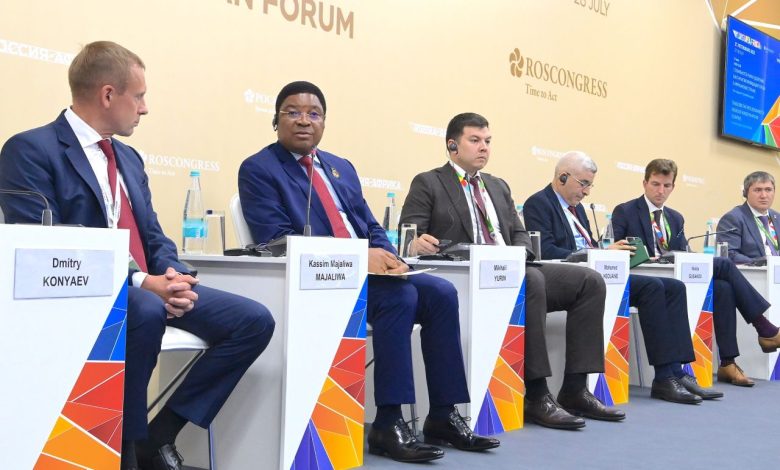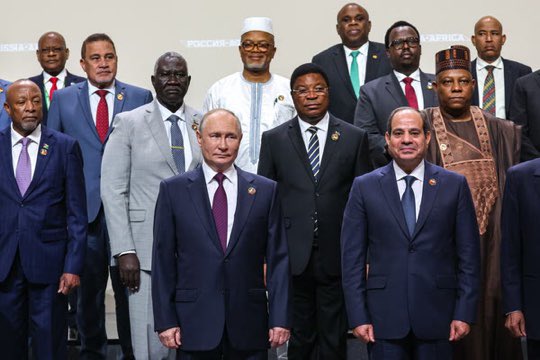
ST Petersburg, Russia’s Imperial capital, hosted the second summit and Russia–Africa Economic and Humanitarian Forum last week attracting heads of state and government from many African countries.

That marked the second time that events of such a magnitude with a focus on a wide range of relations between Russia and African countries have been held.
The Forum and Summit were attended by official delegations from 48 countries (27 countries were represented by the head of state or the second highest official) and the five largest integration associations of the continent. The Summit consisted of two plenary sessions held on Friday.
Russian President Vladimir Putin, Chairperson of the African Union and President of the Union of the Comoros Azali Assoumani, Chairperson of the African Union Commission Moussa Faki Mahamat and the heads of state from African countries spoke during the first part of the summit.
Discussions continued in the format of a working breakfast during the second meeting of the summit.
“We had a substantive and engaging exchange of views on the entire range of themes of strategic cooperation between Russia and African countries […].
We have identified the main areas for further joint work and outlined plans to strengthen foreign policy coordination and increase trade and investment flows, as well as industrial cooperation between Russia and the countries of the [African] continent,” Russian President, Vladimir Putin said during his closing speech at the second plenary session of the Summit “We greatly appreciate the results of our joint work at the Summit.
I firmly believe that the results we have achieved will form a good foundation for the further deepening the Russian-African partnership in the interests of the prosperity and well-being of our peoples.”
During the discussions, the participants declared their commitment to jointly building a new, fairer multipolar architecture of the world order based on the sovereign equality of states and mutually beneficial cooperation.
The Summit resulted in the adoption of five key documents: ●Declaration of the Second Russia–Africa Summit
●Declaration of the Second Russia–Africa Summit on the Prevention of an Arms Race in Outer Space
●Declaration of the Second Russia–Africa Summit on Cooperation to Ensure International Information Security
●Declaration of the Second Russia–Africa Summit on Strengthening Cooperation to Combat Terrorism
●Action Plan of the Russia–Africa Partnership Forum for 2023–2026 Two documents were also signed with leading African integration associations in Vladimir Putin’s presence:
●Memorandum of Understanding between the Russian Government and the Intergovernmental Authority on Development (IGAD) on fundamental issues concerning relations and cooperation
●Memorandum of Understanding between the Russian Government and the Economic Community of Central African States (ECCAS) on fundamental issues concerning relations and cooperation.
The business programme of the Russia–Africa Economic and Humanitarian Forum featured discussions on how to unleash the potential of Russian-African cooperation.
A humanitarian dimension was added to the traditional political and economic focuses.
The central event of the Forum was the plenary session, which was attended by Russian President Vladimir Putin, Chairperson of the African Union and President of the Union of the Comoros Azali Assoumani, Patriarch Kirill of Moscow and All Russia, President and Chairman of the Board of Directors of the African Export-Import Bank Benedict Oramah, and New Development Bank President Dilma Rousseff. The meeting was moderated by Director of the Institute for African Studies of the Russian Academy of Sciences Irina Abramova.
“This marks the second time that Russia is hosting events in the Russia–Africa format.
This year, the discussions of the Economic and Humanitarian Forum were full of practical proposals, particularly in the humanitarian and technological fields, and generated significant interest from representatives of business and the scientific community.
Over 9,000 participants and media representatives from Russia and 104 foreign states and territories took part in the events this time.
The participants included around 1,000 representatives of foreign business, more than 2,000 [representatives of] Russian [business], roughly 1,100 representatives of foreign official delegations, and more than 750 Russian [delegations],” said Anton Kobyakov, Adviser to the Russian President and Executive Secretary of the Organising Committee for the Russia–Africa events.
A total of 59 panel sessions were held with 457 speakers in four main areas: ‘The New Global Economy’, ‘Cooperation in Science and Technology’, ‘The Humanitarian and Social Sphere: Working Together for a New Quality of Life’, and ‘Integrated Security and Sovereign Development’.
Events held on the sidelines of the Forum and Summit included the Media Forum, the Congress of University Rectors, a roundtable attended by the supreme audit institutions of Russia and African countries, youth programme events, and sessions of the Creative Business Forum and the Healthy Life Forum.
The cultural and sports programme featured the St. Petersburg Seasons Festival, a race organised by the Roscongress Foundation jointly with the League of Heroes and the Ladoga Gold International Multi-Stage Professional Cycling Race.
The Forum resulted in the signing of 161 agreements that do not constitute commercial secrets (146 agreements with foreign organisations and authorities), although the value of the agreements was not disclosed. Most of the agreements were for humanitarian cooperation, with the largest number of agreements concluded in the following industries: ●International and interregional cooperation – 56
●Education and science – 51
●Scientific and technical cooperation – 10
●Exports and foreign economic activity – 10 Sports programme During the Forum’s sports programme, Russian Minister of Sports Oleg Matytsin, President of the Russian Rhythmic Gymnastics Federation Irina Viner, and Russian Olympic Committee President Stanislav Pozdnyakov discussed expanding cooperation with African colleagues at the session ‘Sport: A Bridge of Friendship between Russia and Africa’.
The session was highlighted by the presentation of the Friendship Games, which will be held in September 2024 in Moscow and Yekaterinburg. The new flagship project for Russian sports was presented by its initiator, International Boxing Association President Umar Kremlev and General Director of the Friendship Games Organising Committee Alexey Sorokin.
The Roscongress Foundation and the Friendship Games Organising Committee signed a cooperation agreement.
The pavilion of the Russian Ministry of Sports served as a platform for negotiations and the presentation of new sports projects. On the first day of the Forum, more than 1,000 people attended the five-kilometre ‘We Are Starting’ morning race.
Three-time Olympic synchronised swimming champion Svetlana Kolesnichenko got everyone warmed up for the race. Sergey Shevchenko from Belarus won the inaugural Ladoga Gold International Multi-Stage Professional Cycling Race, which passed more than 1,000 kilometres around Lake Ladoga.
Teams from Ghana, Cameroon, and Mali took part in the Russia–Africa student football festival, which was won by a team from Kuban State University. Football stars Andrey Arshavin, Alexander Mostovoy, Dmitry Sychev, MacBeth Sibaya (South Africa), Dame N’Doye (Senegal), and Chidi Odiah (Nigeria) competed together with the Forum participants in a gala match between the Russian and African teams.
A stage of the Russian beach volleyball championship was also held as part of the Forum.
___
Source here
